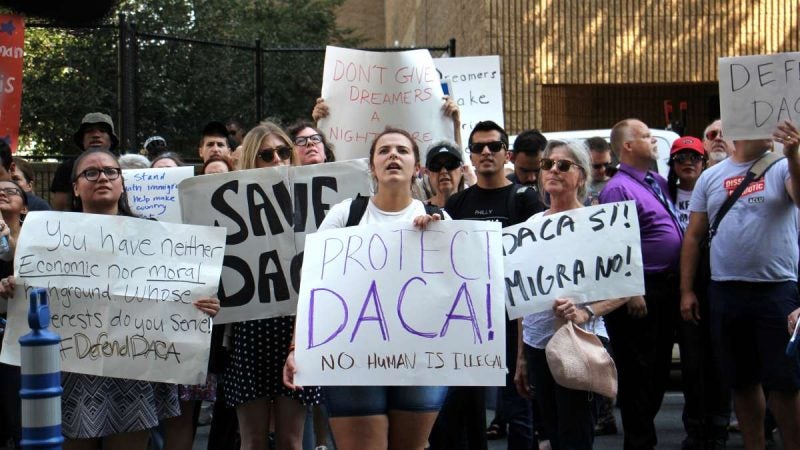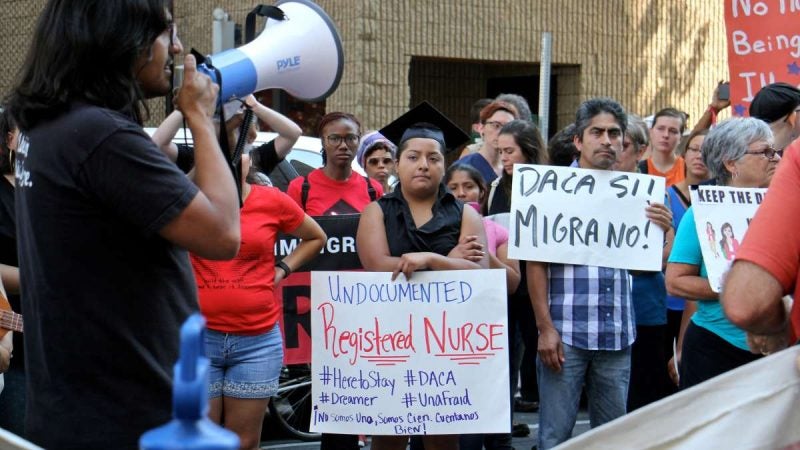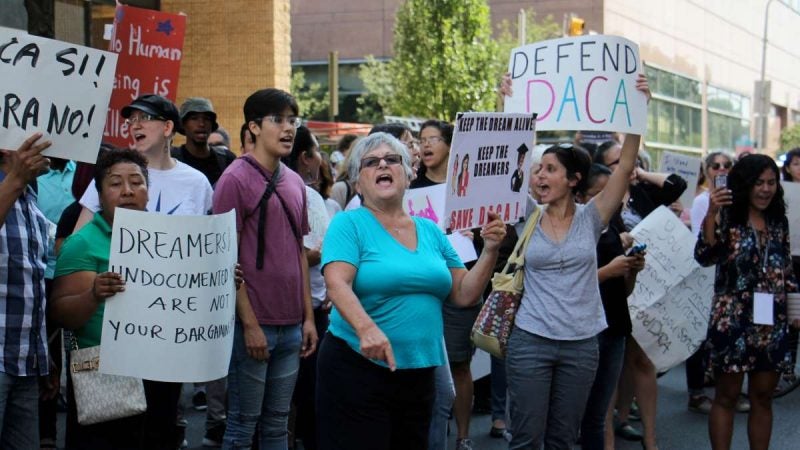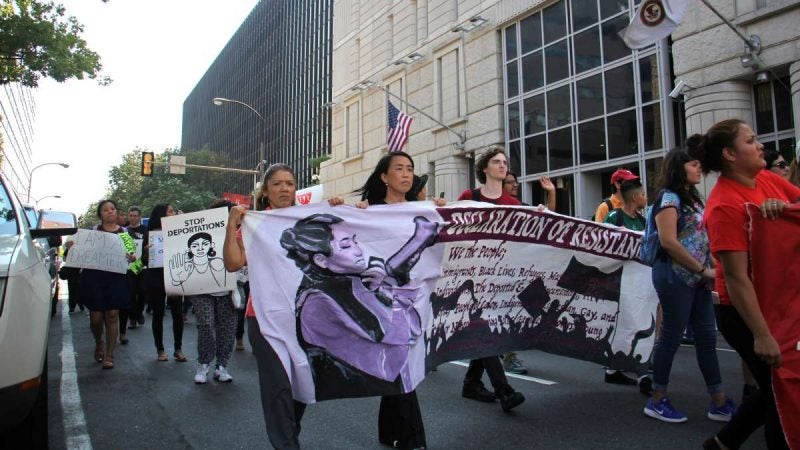‘Dreamers’ react in anger, fear, but not surprise over Trump ending DACA
-

About 200 protesters marched from the Department of Justice on Chestnut Street to the Federal Prison on Arch Street to demand protection for young immigrants who arrived in the U.S. illegally as children and have been given a path to citizenship through DACA (Deferred Action for Childhood Arrivals). (Emma Lee/WHYY)
-

Anel Medina, a registered nurse who graduated from Delaware County Community College, joins a rally in support of DACA. (Emma Lee/WHYY)
-

Erika Almiron, of the Latino immigrant rights organization Juntos, pleads for the continuation of DACA with protesters who gathered on Arch Street outside the Federal Prison. (Emma Lee/WHYY)
-

Terry Baraldi of Landsdowne (center) and Alison Fraser of Jenkintown (center right) join activists an members of the immigrant community in support of DACA (Deferred Action for Childhood Arrivals). (Emma Lee/WHYY)
-

Philadelphia City Councilwoman Helen Gym marches with protesters in support of DACA (Deferred Action for Childhood Arrivals). The Trump administration announced plans to end the program that gives immigrants who arrived illegally in the United States as children a chance to stay. (Emma Lee/WHYY)
-

Mounted police follow protesters on Arch Street as they wind their way through Center City. (Emma Lee/WHYY)
Anel Medina was five when her mother illegally brought her to Chester County from Mexico.
On Tuesday, the 26-year-old registered nurse spoke about what it felt like to be approved for Deferred Action for Childhood Arrivals, or DACA, which gave her the chance to pursue her dream career in medicine.
“It was finally like a break. This is the opportunity I’ve been waiting for and I took advantage of it since day one,” she said.
Around the Philadelphia region, she and other DACA recipients reacted with apprehension, and in some cases tears, to the news that the Trump administration plans to end the program in six months. It shields young people brought into the country illegally as children from deportation and allows them to temporarily study and work in the U.S.
With that protection now sunsetting, Medina said she’s nervous about the future.
In Pennsylvania, New Jersey and Delaware, more than 29,000 people have benefited from the program since it launched in 2012 under the Obama administration, according to U.S. Citizenship and Immigration Services. To qualify, child arrivals must have come to the U.S. before turning 16 and have been younger than 31 on June 15, 2012. They also must complete high school, or get a GED, and pass a background check.
In exchange, “Dreamers” as recipients are popularly called, can receive authorization to work legally, a driver’s license and a Social Security card, although they cannot access federal government benefits.
On Tuesday morning, protesters criticizing the administration’s decision rallied outside the U.S. Department of Justice office on Chestnut Street in Philadelphia. More than 100 people chanted and marched through Old City.
“You know Trump will be Trump. He ran his campaign… on hate on us,” said Olivia Vasquez, a DACA recipient and community organizer. Since Trump took office in January, U.S. Immigration and Customs Enforcement has taken some recipients who let their status lapse or committed misdemeanor criminal offenses into custody.
What could come next for ‘Dreamers’
With its decision to end DACA effective March 2018, the Trump administration passed the buck to Congress, which must now choose whether to let it lapse or make it permanent.
If Congress chooses the second option, most Dreamers have few options to remain in the country legally, according to William Stock, a past president of the American Immigration Lawyers Association.
“It’s going to depend on their individual circumstances,” he said.
But, even those with no road to remain legally may still languish in limbo if the program ends. Nearly all of them would be entitled to a hearing before a judge in the country’s backlogged immigration court system, and the sheer number of DACA recipients — roughly 800,000 across the country — means deporting them all would be a complicated and expensive endeavor.
“There are not resources to get them all at once, and once a legal process starts, they may have rights,” said Stock.
Philadelphia area Republican lawmakers expressed support and sympathy for this group of young immigrants, although some, like New Jersey Congressman Frank LoBiondo, also said they believe the president was right to take action.
“It was clear from the beginning that President Obama’s DACA program was a violation of executive authority,” he said in a written statement. “President Trump is right to call out Congress for failing to address critical immigration issues for many years.”
At Tuesday’s rally in Philadelphia, the message from organizers was to make sure Congress doesn’t let the issue slip off its radar.
But some DACA recipients, like Swarthmore College student Maria Castañeda, acknowledged that constantly advocating for the program has already taken its toll on them.
“To be frank, I’m also here today because I’m exhausted,” she said, choking up. “Having to fight for your humanity, and having to fight for your dignity, is exhausting.”
WHYY is your source for fact-based, in-depth journalism and information. As a nonprofit organization, we rely on financial support from readers like you. Please give today.




